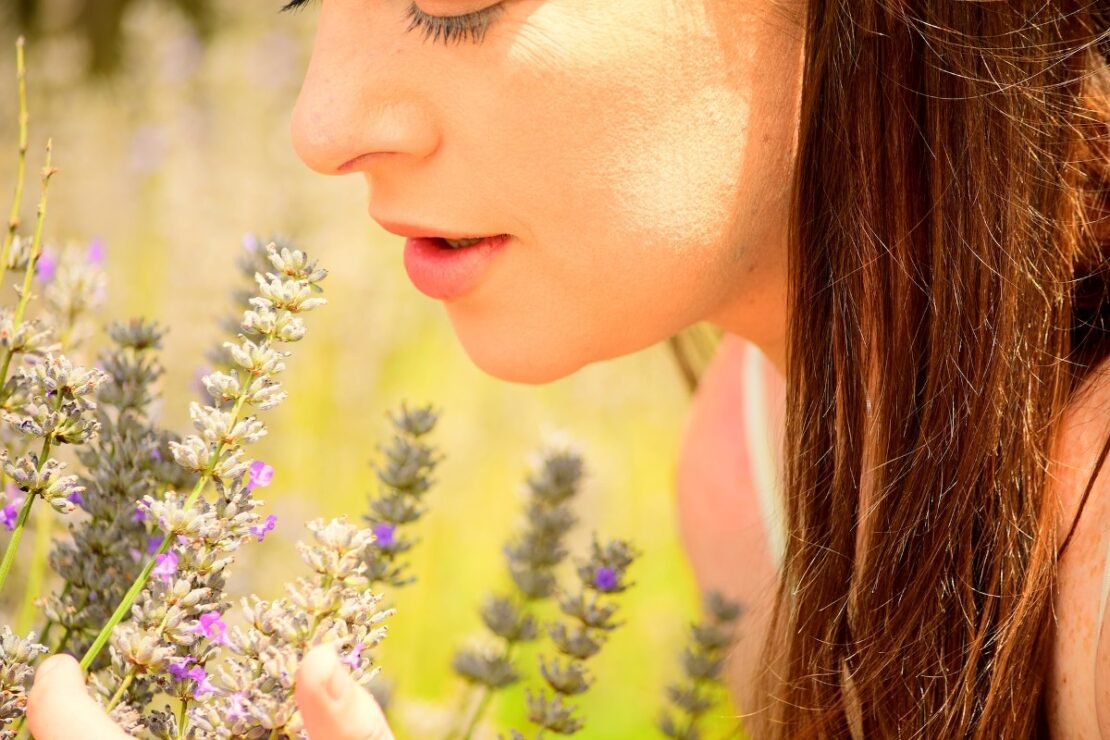
How Does Scent Affect Mood?
On an intuitive and experiential level, many of us are aware of the connection between scent and mood. Though some may tune into the significance of scent more consciously than others, our sense of smell is intimately related to our emotions and even cognitive function and spatial awareness (Fifth Sense, 2021). Furthermore, appealing scents enhance our lives. We can all relate to the feeling of walking into a room that smells divine. Be it fresh-baked bread, lavender, pine needles, or a simmering herbal vegetable soup, smell has the power to evoke emotion—and the loss of it can have detrimental effects. In addition to our intuitive knowledge about the relationship between scent and psychology, science and herbal traditions have quite a bit to say about this connection. Whether you are looking to ease anxiety, enhance your focus, or create a cozy atmosphere, aromatherapy is a powerful way to influence mood.
Aromatherapy: New Terminology, Ancient Practice
Though the practice of working with scent to evoke a particular feeling is an age-old art, it was not until the 1900s that French chemist and perfumer René-Maurice Gattefossé identified aromatherapy as a distinct discipline with applications for wellness (Ratajc, n.d.). However, though aromatherapy may not have been formalized as a discipline in this way until relatively recent history, scent has long been used in this manner. We know that when we smell something good we often want to move closer to it—and when we smell something bad it can make our stomachs turn. In fact, Ayurveda and other health traditions view all stimuli absorbed through the five senses as having the potential to lead us to either health or illness. As one of my Ayurveda teachers said, “If a smell can make you sick, why can’t a smell make you well?” Much in the same way that listening to enjoyable music or viewing a stunning natural landscape can evoke feelings of wellness and peace, working with scent is another way in which we can impact our well-being. Let’s take a deeper look at how scent and mood interact.

The Science Behind Scent and Psychology
Odor identification (being able to recognize something that you have smelled before) is incredibly important. A lack of sense of smell is linked to Alzheimer’s and Parkinson’s disease and can even indicate a higher likelihood of dying within 5 years (Pinto et al., 2014). Many of us are familiar with the loss of smell and taste as a symptom of COVID-19 and how troublesome that can be. However, people still commonly underestimate the power of smell. According to a study conducted by neuroscientist and smell expert Rachel Herz, 25% of people would rather lose their sense of smell than their smartphone (Fifth Sense, 2021)!
So how do smell and mood relate? Smell is unique and potent in that there is a direct line of communication between the olfactory bulbs and the amygdala-hippocampal complex of the limbic system. This part of the limbic system, which the olfactory bulbs synapse into, plays a key role in governing our emotional responses, emotional memory, and spatial navigation (Fifth Sense, 2021). “None of our other senses have this level of targeted connection with the areas of the brain that process emotion, associative learning, and memory” (Herz, 2016, para 5). The link between sense of smell and memory is so well recognized that it has a special name: the Proust phenomenon, named after author Marcel Proust, who wrote about the taste of madeleines (tiny sponge cakes) and linden tea evoking powerful memories (Walsh, 2020).
To further underscore the connection between emotions and scent, since emotions are processed in the same place as the primary olfactory cortex (within the limbic system), if one’s sense of smell is compromised, emotional processing is affected as well. This can lead to a decline in emotional well-being and even serious depression (Fifth Sense, 2021).
Furthermore, the hypothalamus, which is connected to sexual behavior, is also part of the limbic system. Motivations for food and sexual behavior are closely related to the sense of smell. Scent is a well-known factor in sexual attraction and the ability to orgasm can even be compromised when one’s sense of smell suffers (Fifth Sense, 2021).
Losing one’s sense of smell certainly puts a damper on the joy of tasting food. Without the ability to smell, we lose much of our capacity for tasting nuance and flavor in food. A chocolate cake tastes just plain sweet rather than possessing the multifaceted flavor of cocoa, fat, and its other tasty ingredients. True story—my sister tested positive for COVID-19 on her honeymoon en route from Paris to Italy—of all places! Sadly, she could barely taste any of the fabulous Italian food the newlyweds procured for mealtimes. She reported that her sense of taste was basically reduced to detecting sweet, sour, and salty. Fortunately, her sense of smell—and therefore taste—came back within a few days. However, her experience highlights the intertwining of taste and smell.
Scent and Mood: Science and Tradition
There is clearly a distinctive link between scent, mood, and memory. However, depending upon how the individual interprets a particular smell (as in the case of associated memories), the resulting mood and emotions triggered may vary from person to person. A single smell may not evoke the same feeling from one person to the next. That said, there is a significant body of knowledge in both modern science and herbal tradition that points to the connection between specific scents and psychological states.
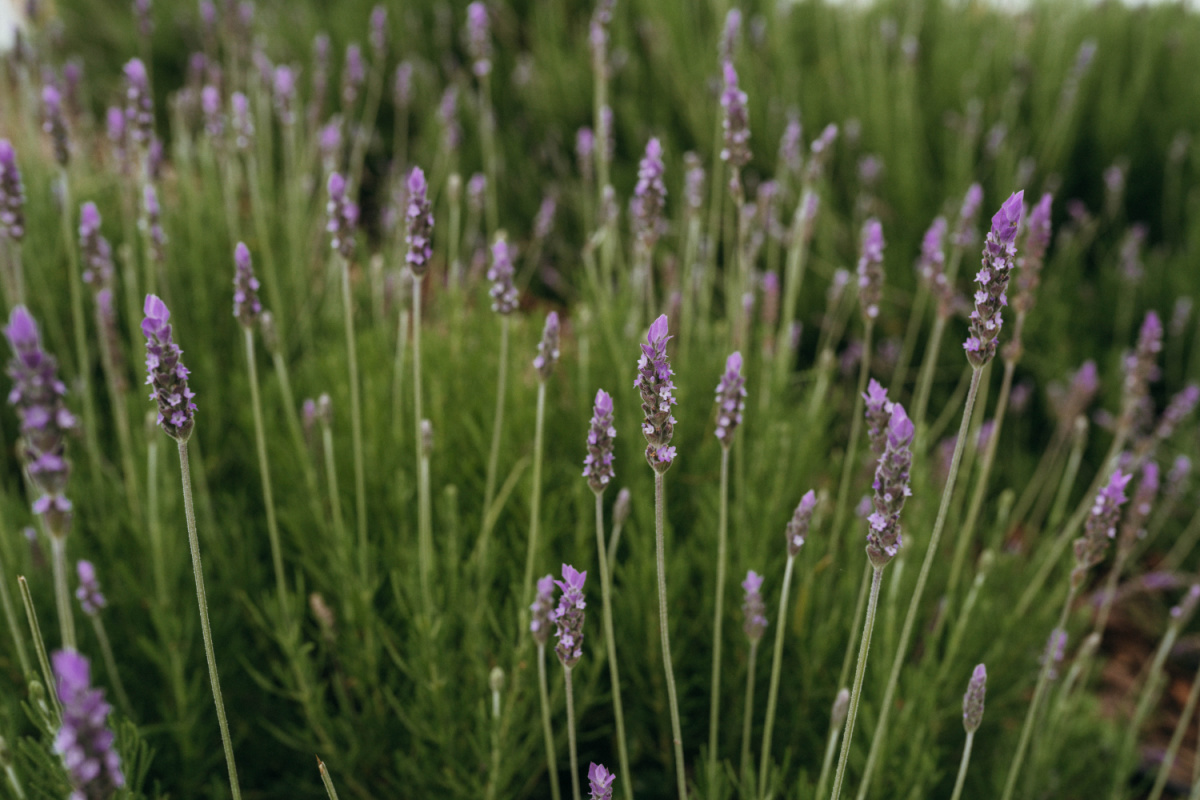
Lavender (Lavandula spp.)
Lavender is well respected by herbalists across traditions for its soothing, calming qualities. According to Ayurveda, lavender has a cooling energy and though it is tridoshic, appropriate for all doshas, is particularly suited to pitta dosha due to its calming, cooling energy, and ability to promote feelings of contentment (Halpern, 2012). Herbalist Maria Noel Groves (2016) describes lavender as promoting emotional and spiritual calm.
There has been a fair amount of scientific research that points to lavender’s capabilities. To give one example, 80 mg of Silexan, a lavender oil preparation, was given to participants across several clinical trials for a period of 6 to 10 weeks. The findings were significant. The lavender oil preparation was found to significantly reduce anxiety after 2 weeks in patients with anxiety disorders who were below the threshold of diagnosis. The Silexan was also shown to assist with sleep and somatic complaints (Kasper et al., 2018).
In the research mentioned above, lavender was administered orally. However, the same calming effects of lavender are experienced when the floral aroma of lavender is inhaled as an essential oil or other preparation made from the whole flower bud. One study of 200 dental patients showed that inhaling ambient lavender and orange essential oils while in the waiting room significantly reduced anxiety and improved mood (Lehrner et al., 2005).
In my Ayurveda practice, I often suggest that clients who struggle with sleep diffuse lavender essential oil in the evening an hour or two before bedtime to assist the nervous system in winding down in preparation for sleep. If you have an office that serves the public, you may want to consider diffusing pleasing essential oils such as lavender in the waiting room and/or restroom. I have even experienced lavender oil diffused in the restroom of a tattoo artist—as a client, I can attest to the comforting effect!
Bergamot (Citrus bergamia)
Bergamot is another aromatic, citrusy-scented herb that has demonstrated its effectiveness in enhancing mood and promoting relaxation. In one study, 57 adults were exposed to ambient bergamot essential oil for 15 minutes; those exposed to the bergamot aroma demonstrated significantly more positive emotions than the control group (Han et al., 2017). In another study of 109 surgery patients, those who inhaled a diffusion of bergamot essential oil showed a significant reduction in preoperative anxiety compared to the control group (Ni et al., 2013). Aromatherapists underscore bergamot’s capacity for promoting relaxation and reducing stress and thus being an effective aromatherapy choice in addressing burnout (Rogers, n.d.). So, if you wish to promote feelings of calm, bergamot, like lavender, is a pleasing and useful herb that is perfectly suited for diffusion.
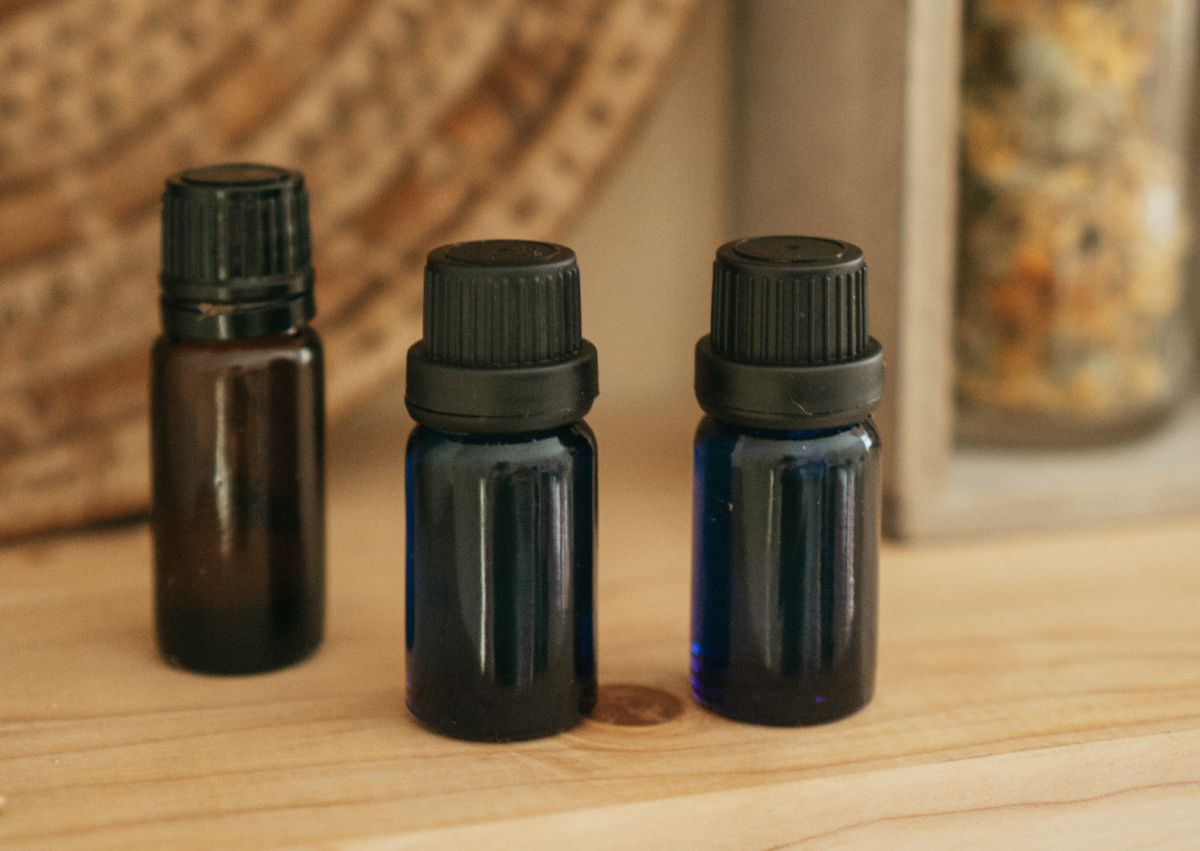
Aromatherapy and Tradition
While science offers much support for the application of aromatherapy in influencing mood, it is also helpful to turn to tradition to guide us as to which scents to choose for one’s particular desired outcome. Here are a few tips from Ayurveda on the effects and energetics of different botanical aromas (Halpern, 2012; Tirtha, 1998).
Holy basil/tulsi (Ocimum tenuiflorum): Balances vata and kapha doshas, may increase pitta dosha if used excessively. Clears the mind, is sattvic, purifies the air, and promotes intuition.
Eucalyptus (Eucalyptus spp.): Clears negative thoughts and opens the mind. Ideal for vata and kapha doshas.
Jasmine (Jasminum officinale): Particularly balancing for pitta dosha, may help to uplift heavy emotions, as in cases of mild depression.
Lavender (Lavandula spp.): Calms the nervous system and smoothes out emotions. Appropriate for all three doshas.
Rose (Rosa spp.): Nourishes the heart center and promotes love, compassion, and devotion. Particularly balancing for pitta and vata doshas due to its sweet, nourishing energetics.
Rosemary (Salvia rosmarinus): Soothes headaches and emotional tension. Is a well-known memory enhancer and may be useful for depression and anxiety. Ideal for pitta and vata doshas.
Peppermint (Mentha x piperita): Clarifying for the mind, head, and sinuses. On a personal note, I find the scent of peppermint essential oil to be incredibly cheerful—and diffusing it in the bathroom creates a clean-smelling, appealing atmosphere.
Safety Considerations
When working with essential oils, particularly around children and pets, it’s always important to consider safety. This Guide to Essential Oil Safety is a great place to start.
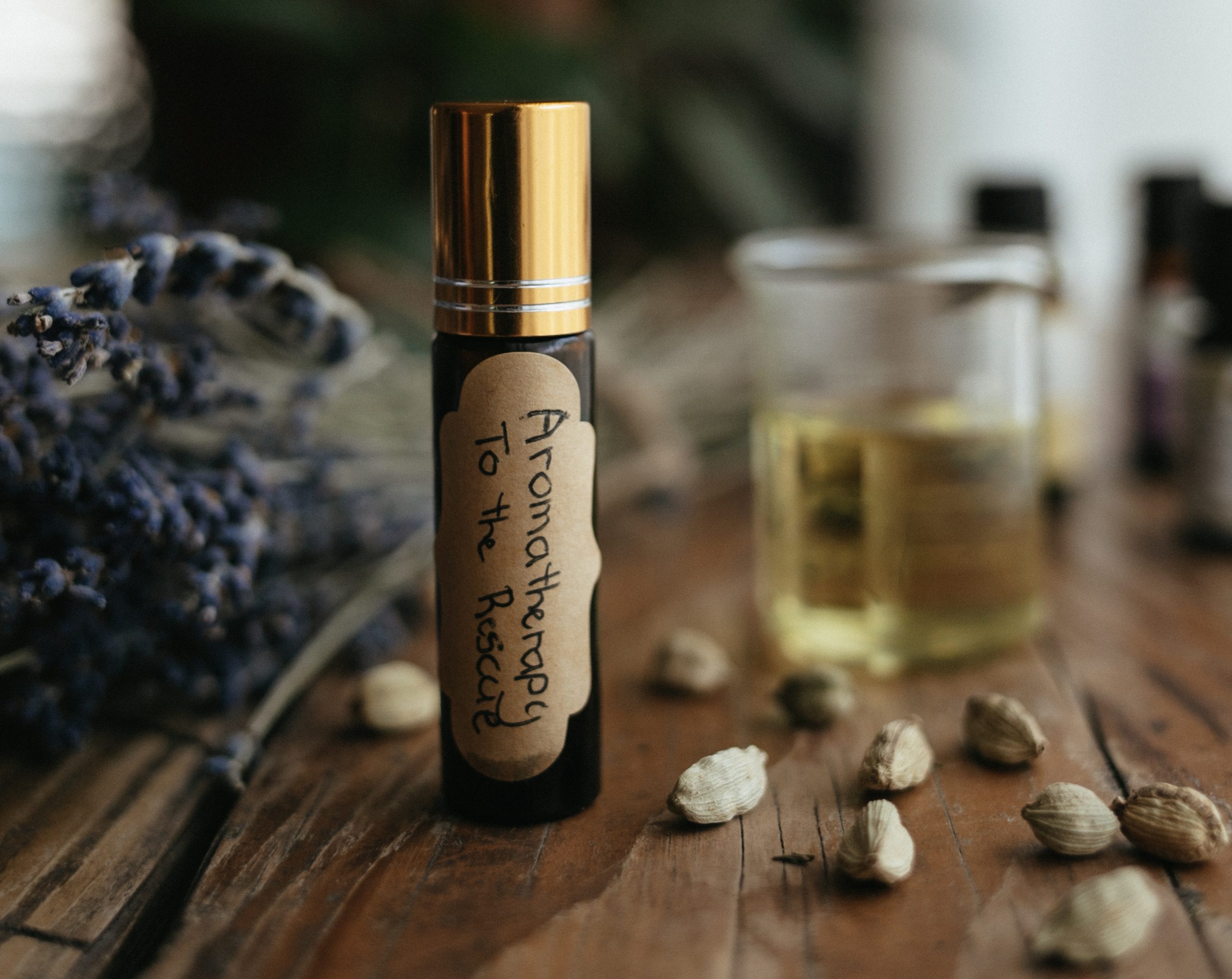
In Closing,
After reading this article, my hope is that you will have an enhanced appreciation for your sense of smell. Our ability to smell is intimately linked to mood, appetite, arousal, and even cognitive and spatial function. Though there is much scientific research and traditional wisdom to support the connection between specific aromas and mood, it’s helpful to remember that we each have our own memory maps when it comes to scent. Pay attention to how you respond to different aromas—by fine-tuning your self-awareness when it comes to scent and mood, you can better curate your own mood atmosphere through the use of scent.
Want to dive deeper into the practice of working with scent? Check out our Online Natural Perfumery Course and follow your nose into a new chapter of herbal education. The Natural Perfumery Course includes all the information you need to start blending your own botanical perfumes at home today, including over 20 recipes, a special collection of perfumery plant monographs, simple rituals for incorporating them into your lifestyle, expert guidance, and beautifully illustrated downloads for safety, sustainability, techniques and more.
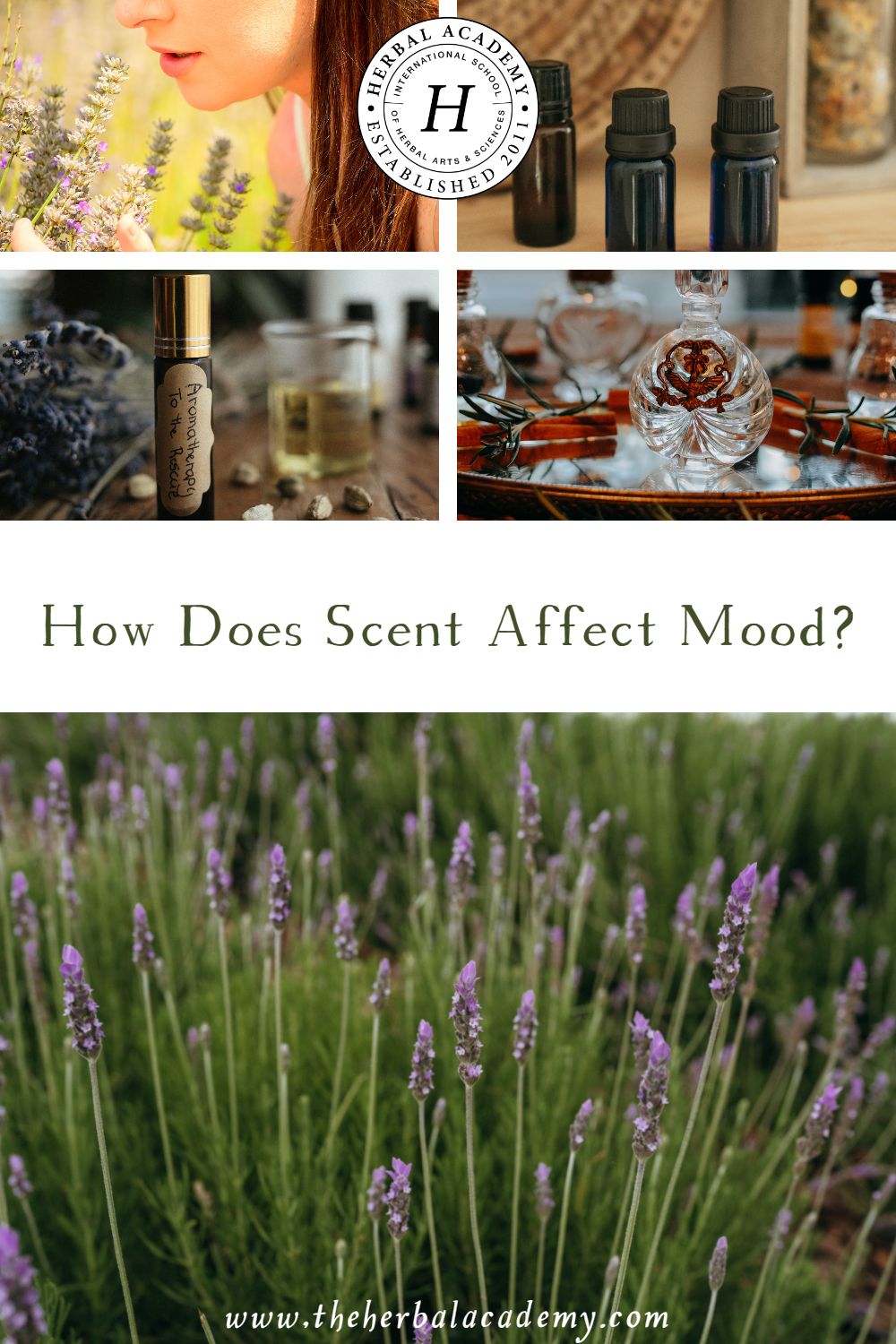
REFERENCES
Groves, M.N. (2016). Body into balance: An herbal guide to holistic self-care. Storey Publishing.
Halpern, M. (2012). Principles of ayurvedic medicine. California College of Ayurveda.
Han, X., Gibson, J., Eggett, D.L., & Parker, T.L. (2017). Bergamot (Citrus bergamia) essential oil inhalation improves positive feelings in the waiting room of a mental health treatment center: A pilot study. Phytotherapy Research: PTR, 31(5), 812–816. https://doi.org/10.1002/ptr.5806
Herz, R. (2016). The role of odor-evoked memory in psychological and physiological health. Brain Science, 6(3), 22 https://doi.org/10.3390/brainsci6030022
Kasper, S., Muller, W., Volz, H-P., Moller, H-J., Koch, E., & Dienel, A. (2018). Silexan in anxiety disorders: Clinical data and pharmacological background. The World Journal of Biological Psychiatry, 19, 6. https://doi.org/10.1080/15622975.2017.1331046
Lehrner, J., Marwinski, G., Lehr, S., Johren, P., & Deecke, L. (2005). Ambient odors of orange and lavender reduce anxiety and improve mood in a dental office. Physiology & Behavior, 86(1-2), 92–95. https://doi.org/10.1016/j.physbeh.2005.06.031
Ni, C.H., Hou, W.H., Kao, C.C., Chang, M.L., Yu, L.F., Wu, C.C., & Chen, C. (2013). The anxiolytic effect of aromatherapy on patients awaiting ambulatory surgery: A randomized controlled trial. Evidence-Based Complementary and Alternative Medicine, 927419. https://doi.org/10.1155/2013/927419
Pinto, J. M., Wroblewski, K. E., Kern, D. W., Schumm, L. P., & McClintock, M. K. (2014). Olfactory dysfunction predicts 5-year mortality in older adults. PloS one, 9(10), e107541. https://doi.org/10.1371/journal.pone.0107541
The Psychology and Quality of Life Impact of Smell Loss. (2021). Fifth Sense. Retrieved June 16, 2023, from https://www.fifthsense.org.uk/psychology-and-smell/.
Ratajc, P. (n.d.) What is aromatherapy? The dividing lines between feel-good and medicine. Tisserand Institute. https://tisserandinstitute.org/what-is-aromatherapy-petra-ratajc/
Rogers, K. (n.d.) Burnout & bergamot. The School of Aromatic Studies. https://aromaticstudies.com/burnout-bergamot/
Tirtha, S. (1998). The Ayurveda encyclopedia. Ayurveda Holistic Center Press.
Walsh, C. (2020). What the nose knows. Harvard Gazette. https://news.harvard.edu/gazette/story/2020/02/how-scent-emotion-and-memory-are-intertwined-and-exploited/








